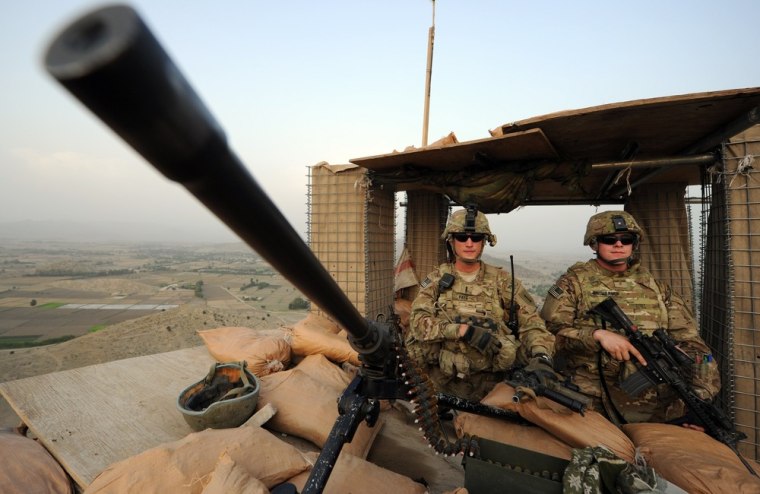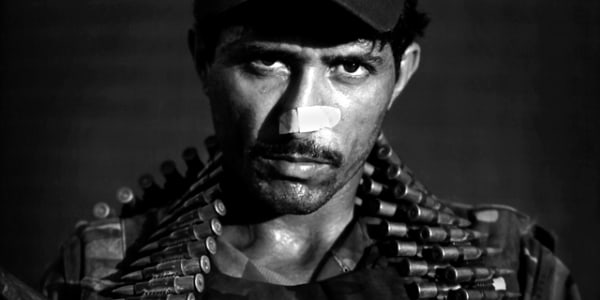President Barack Obama is expected to withdraw roughly 10,000 U.S. troops from Afghanistan this year, with one brigade of about 5,000 forces leaving this summer and a second brigade of similar size coming home by the end of the year, a senior U.S. defense official said Tuesday.
Obama is also weighing a timetable for bringing home the 20,000 other "surge" troops he ordered to Afghanistan as part of his December 2009 decision to send reinforcements to reverse the Taliban's battlefield momentum.
CNN reported Tuesday that Obama is expected to announce that those troops will be withdrawn by the end of 2012.
Ahead of his primetime address Wednesday on U.S. plans for Afghanistan, Obama called Defense Secretary Robert Gates and Secretary of State Hillary Clinton to the White House Tuesday for an Afghanistan strategy session.
Obama will address the nation at 8 p.m. EDT, the White House said.
Jay Carney, Obama's press secretary, said the president finalized his decision on the Afghan drawdown Tuesday afternoon and that earlier reports were just "speculation," NBC News reported.
Carney said Obama would deliver his speech in primetime so he could "reach the American people and explain his decision," which is more easily done at night, NBC News reported.
Aides have said Obama wants to ensure that the drawdown set to begin next month puts the U.S. on a path toward giving Afghans control of their own security by 2014.
Obama was given a range of options for the withdrawal last week by Gen. David Petraeus, the top U.S. and NATO commander in Afghanistan. The military favors a gradual reduction in troops but other advisers are advocating a significant decrease in the coming months.
The president has said he favors a significant withdrawal, but his advisers have not quantified that statement.
At a Democratic fundraiser in Washington Monday night, Obama said that by the end of the year, "we will be transitioning in Afghanistan to turn over more and more security to the Afghan people."
Following the announcement on the drawdown, Obama will visit troops Thursday at Fort Drum, the upstate New York military base that is home to the 10th Mountain Division, one of the most frequently deployed divisions to Afghanistan and Iraq.
How fast a drawdown debated
While much of the attention is focused on how many troops will leave Afghanistan next month, the more telling aspects of Obama's decision center on what happens after July, particularly how long the president plans to keep the surge forces in the country.
Military commanders want to keep as many of those forces in Afghanistan for as long as possible, arguing that too fast a withdrawal could undermine the fragile security gains in the fight against the Taliban insurgency in Afghanistan, the al-Qaida training ground for the Sept. 11 attacks. There are also concerns about pulling out a substantial number of U.S. forces as the heightened summer fighting season gets under way.
Gates has said he believes the initial drawdown should be "modest."
But other advisers backed a more significant withdrawal that starts in July and proceeds steadily through the following months. That camp believes the slow yet steady security gains in Afghanistan, combined with the death of Osama bin Laden and U.S. success in dismantling much of the al-Qaida network in the country, give the president an opportunity to make larger reductions this year.
Gates, who is retiring from the Pentagon next week, has said Obama's decision needs to incorporate domestic concerns about the war in Afghanistan into his decision on drawing down American troops there.
"It goes without saying that there are a lot of reservations in the Congress about the war in Afghanistan and our level of commitment. There are concerns among the American people who are tired of a decade of war," Gates said during a news conference at the State Department Tuesday.
Twenty-seven senators, Democrats as well as Republicans, sent Obama a letter last week pressing for a shift in Afghanistan strategy and major troop cuts.
"Given our successes, it is the right moment to initiate a sizable and sustained reduction in forces, with the goal of steadily redeploying all regular combat troops," the senators wrote. "The costs of prolonging the war far outweigh the benefits."
McCain: We can get the war 'wrapped up'
Arizona Sen. John McCain, the top Republican on the Senate Armed Services Committee, differed with that assessment. He told ABC's "Good Morning America" on Tuesday that he agreed with Gates in hoping the withdrawal would be "modest."
"I believe that one more fighting season and we can get this thing pretty well wrapped up," McCain said.
There is broad public support for starting to withdraw U.S. troops. According to an Associated Press-GfK poll last month, 80 percent of Americans say they approve of Obama's decision to begin withdrawal of combat troops in July and end U.S. combat operations in Afghanistan by 2014. Just 15 percent disapprove.
Obama has tripled the number of U.S. forces in Afghanistan since taking office, bringing the total there to about 100,000. The 30,000-troop surge he announced at the end of 2009 came with the condition that he would start bringing forces home in July 2011.
Slideshow 10 photos
Soldiers of the Afghan National Army
The president took months to settle on the surge strategy. This time around, aides say the process is far less formal and Obama is far more knowledgeable about the situation in Afghanistan than he was in 2009, his first year in office.
With the troop withdrawal set to begin next month, U.S. officials in Afghanistan said Tuesday they will shift their development priorities from quick-impact stability programs run by international agencies to infrastructure and economic growth projects that can be run by Afghans over the long term.
Officials speaking at a background briefing at the Kabul embassy said hydroelectric dams, roads, gas fields, mines, and increased agricultural production will be the focus of their efforts as the end of 2014 approaches, the president's promised deadline for the withdrawal of all combat troops.
There are also indications that the administration, having learned from the U.S. experience in Iraq, will set deadline dates for the drawdown as it progresses, in order to keep pressure on the Afghans and give Congress mileposts.
With Iraq as a blueprint, commanders will need time to figure out what they call "battlefield geometry" — what types of troops are needed where. Those could include trainers, intelligence officers, special operations forces, various support units — from medical and construction to air transport — as well as combat troops.
Much of that will depend on where the Afghan security forces are able to take the lead, as well as the state of the insurgency. Part of the debate will also require commanders to determine the appropriate ratio of trainers versus combat troops.

